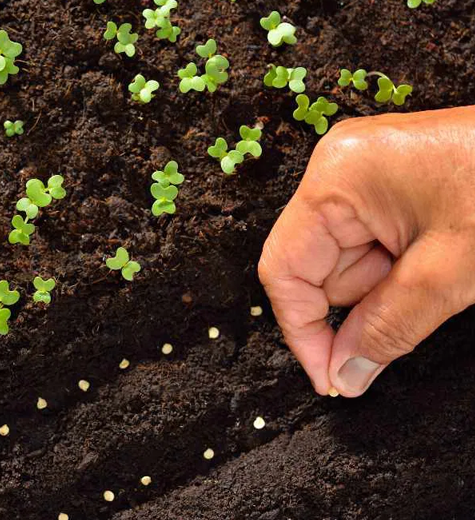- floralseedcompany@gmail.com

CONTRACT PLANTATIONS WITH FLORAL SEED COMPANY
In association with our overseas partners, we have pioneered in contract plantation/Farming in countries like Tanzania, Australia, Florida (U.S.A.) and various other Indian states. Our expertise lies in the vast experience of our technical staff that has successfully managed several projects related to Contract plantation/Farming. We have been engaged since last 3 decades in research, development and production of non-food sustainable bio-fuel crops worldwide in a structured Agri-Supply chain, Value additions and research activities thereon & have been providing technology and services from "Soil to Oil" for the breeding, development, planting and harvesting of next-generation commercial bio-fuel crops. We have been engaged in promoting sustainable farming for biodiesel production since last three decades and ours research findings and on-hand field experiences in respect of various technical, agronomical/silvicultural aspects of plantations of crops & other non-food biodiesel crops have resulted in significant improvements in knowledge and technical background related to Productivity, profitability and sustainability of commercial plants production.
Contract Farming: An overview
Contract farming arrangements of different types have existed in various parts of the country and world for centuries for both subsistence and commercial crops. The commercial crops like sugarcane, cotton, tea, coffee etc have always involved some forms of contract farming. Even in the case of some fruit crops and fisheries, contract farming arrangements, involving mainly the forward trading of commodities have been observed. However, in the wake of economic liberalization, the concept of contract farming in which national or multinational companies enter into contracts for marketing of the horticultural produce and also provide technologies and capital to contract farmers has gained importance. According to this, bipartite agreements are made between the farmer and the company and the latter contributes directly to the management of the farm through input supply as well as technical guidance and also markets the produce. The main features of this type of contract farming are that selected crops are grown by farmers under a buy back agreement with an agency engaged in trading or processing. In such cases, the centralized processing and marketing agencies supply technology and resources, including planting materials and occasional crop supervision. Under such contracts, the farmer assumes the production related risks, which the price risk is transferred to the company. In some cases, the company also bears the production risk, depending on the stage of crop growth at which the contract is made. In any case, the company bears the entire costs of transaction and marketing. The intensity of the contractual arrangement varies according to the depth and complexity of the provisions in each of the following three areas: Market provision: The grower and buyer agree to terms and conditions for the future sale and purchase of a crop.

In conjunction with the marketing arrangements the buyer agrees to supply selected inputs, including on occasions land preparation and technical advice.
Management specifications:The grower agrees to follow recommended production methods, inputs regimes, and cultivation and harvesting specifications. Commercial farms are distinct from plantations in that they tend to practise mixed farming rather than monoculture.
Amount of Inputs: Plantation Agriculture is capital-intensive. - Clearing a forest to provide the land for cultivation and settlement for this labour- intensive form of agriculture.
Building a distinctive nucleated settlement consisting of the office, factory, storage facilities, utility services, health and education services and employees' houses in a central location relative to the cultivated land.
Buying high-yielding seeds, fertilizers, insecticides and machinery. - Employing a large labour force which will include field workers to look
after the crops. - Engaging skilled management staff to run the plantation and look after the large labour force.

Modern technology is adopted in the production of the crops. High-yielding seeds, fertilizers and pesticides are used. Most crops are processed in a factory on a plantation. Many machines are used to process the outputs to ensure the quality of the products is consistently high. High Farm Output:
The high yields and the high-quality output are a result of efficient cultivation methods and large investments on research into ways of increasing the yields and the quality of the outputs. Benefits to Farmers/Land Owners:
Contract farming can provide the farmers with quality inputs, technical guidance and management skills. Although, we deal only with the contact crops but the farmers can raise their overall awareness of both contract and non-contract crops. This enables him to get accustomed to the ever changing techniques in farming. As the farmers enter into a contractual agreement with us, it minimizes the supply and price risks, as the supply and purchase of specified quantum of the commodity is already fixed mutually. Input and services supplied by Floral Seed Company can include seeds, fertilizers, pesticides, farm machinery, extensions etc. Or may involve only the supply of hybrid seeds and marketing produce. The agreed contract may be either formal or informal as per the requirement at that point of time.

Our Success Stories of Contract farming
Tanzania: Contract plantation of Gmelina Arborea in 500 hectares of land.
Australia: Re-vegetation for Bauxite Ore mines in 300 hectares of land.
U.S.A.: Have done Bamboo plantation in 3000 hectares of land in Florida. We provided the seeds, technology and labour and helped in the plantation in association with our foreign partners.
We can provide with the necessary reports for Bamboo Contract plantation in Florida and other details on our various projects for your kind perusal.
Success of Contract Farming: The overall success measures for successful contracts are: It will work wonders, if the bargaining power of farmer is good and if he is aware of the changing circumstances of agri-business.
The contracting farmer should understand the contracting operations.
Please ask for a quote for Contract Plantation along with your climatic area details and the crop interested.
